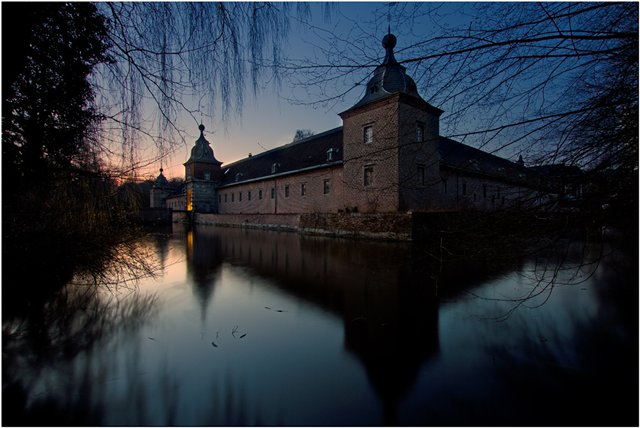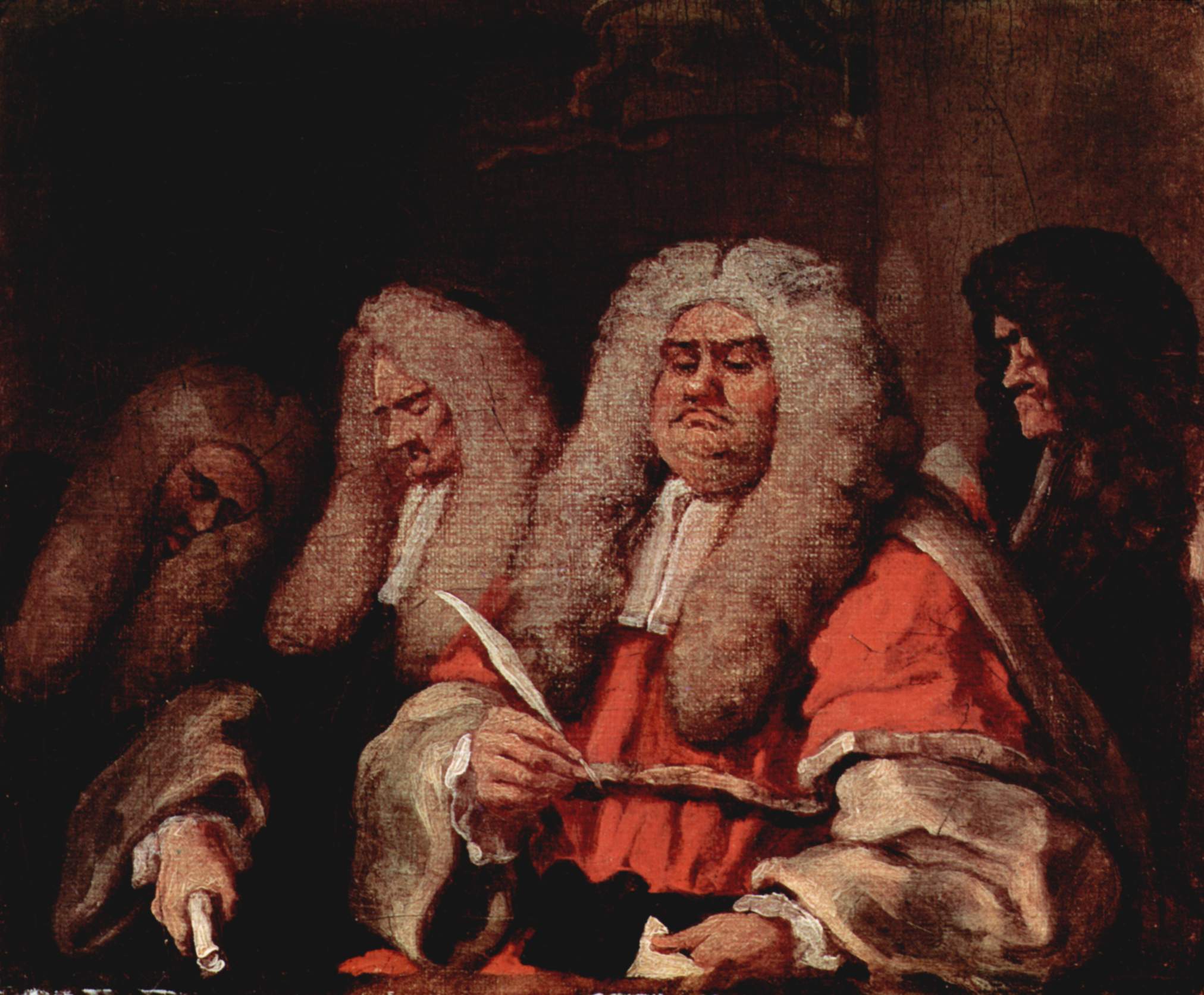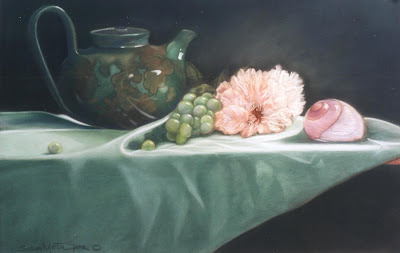The Room in the Dragon Volant
 Saturday, July 16, 2016 at 12:03
Saturday, July 16, 2016 at 12:03 My eyes were often on the solemn old clock over the chimneypiece, which was my sole accomplice in keeping tryst in this iniquitous venture. The sky favored my design, and darkened all things with a sea of clouds.
Richard Beckett
We may concur with the above quote, taken from this novella, apart from the first five words of the second sentence. If it is sometimes impossible to detect from a first-person narrative whether or not the narrator is observant, awake, or even sane, a careful writer will allow him enough interaction with the world, often in dialogue with other characters, for the reader to make that assessment. In The Room in the Dragon Volant, this assessment is ultimately unkind; but the story, like its female protagonist, pulls us towards an eddy with irresistible charm.
 Our time is that "eventful year, 1815," and our protagonist the aforementioned Mr. Beckett, an Englishman of twenty-three. As the tale begins he finds himself the heir to a decent fortune and elects to gallivant around France, a country whose language he speaks smoothly and correctly, and thereby to add to the "philosophical throng" of young people who hoped "to improve their minds by foreign travel" (a most admirable goal). We will learn a lot about Richard Beckett, especially about his weaknesses, the most egregious of which was supposed to have been purged from the European spirit around the year of Beckett's birth – but no matter. The first glance into his values, on the occasion of his helping a horse-drawn coach in distress, does not reassure us:
Our time is that "eventful year, 1815," and our protagonist the aforementioned Mr. Beckett, an Englishman of twenty-three. As the tale begins he finds himself the heir to a decent fortune and elects to gallivant around France, a country whose language he speaks smoothly and correctly, and thereby to add to the "philosophical throng" of young people who hoped "to improve their minds by foreign travel" (a most admirable goal). We will learn a lot about Richard Beckett, especially about his weaknesses, the most egregious of which was supposed to have been purged from the European spirit around the year of Beckett's birth – but no matter. The first glance into his values, on the occasion of his helping a horse-drawn coach in distress, does not reassure us:
The arms that were emblazoned on the panel were peculiar; I remember especially one device – it was the figure of a stork, painted in carmine, upon what the heralds call a 'field or.' The bird was standing upon one leg, and in the other claw held a stone. This is, I believe, the emblem of vigilance. Its oddity struck me, and remained impressed upon my memory. There were supporters besides, but I forget what they were. The courtly manners of these people, the style of their servants, the elegance of their traveling carriage, and the supporters to their arms, satisfied me that they were noble. The lady, you may be sure, was not the less interesting on that account. What a fascination a title exercises upon the imagination! I do not mean on that of snobs or moral flunkies. Superiority of rank is a powerful and genuine influence in love. The idea of superior refinement is associated with it. The careless notice of the squire tells more upon the heart of the pretty milk-maid than years of honest Dobbin's manly devotion, and so on and up. It is an unjust world!
Beckett may not wish to be associated with "moral flunkies," but his subsequent actions make that comparison inevitable. The coach will turn out to belong to a certain Count de St. Alyre, and a much younger woman, "the daughter or wife, it matters not which." That "it matters not which" to our narrator, when it should very much matter, is justified to our incredulous ears by a series of statements on the Countess's misery and the rumored wickedness of her keeper. And so it is to this "beautiful Countess, with the patience of an angel and the beauty of a Venus and the accomplishments of all the Muses," that the idealistic and ingenuous Beckett will recur – but not before he makes the acquaintance of someone he would like to forget, a ghostly soldier called Colonel Gaillarde.
I have not mentioned the plot because the plot is so standard as to be better off left unscrutinized. Gaillarde and another fellow, a Marquis who claims to be incognito for reasons that may satisfy Beckett but should not satisfy us, hover in our hero's vicinity as he makes one bad decision after another. Le Fanu was an amazingly prolific writer who is remembered now mostly for this tale, which somehow has never done it for me. Surely, like everything he composed, Carmilla is a prolonged victory of style; yet, any story that allows supernatural elements to defeat the efforts of man must be of extraordinary interest, a point in which Le Fanu's lady vampire falls short. The real delight in a work like The Room in the Dragon Volant is how a very plain and pleasing plot whose secrets are discernible to even a callow reader can still remain so delicious. Beckett trusts the Marquis from the very beginning because of a mild confidence trick that would admittedly fool much greater minds; but after a bizarre sequence in a coach that could only spell doom for our protagonist, the Marquis inexplicably remains in his good books (perhaps this conceit is merely an attempt to record the sensations as they occurred at the time, since Beckett informs us he is now an old man reminiscing about his twenty-fourth year). Towards the middle of his adventure, Beckett is urged at a masked ball to consult an oracle on his innermost desires – as if they weren't stenciled in boldface on his sleeve, but anyway. The result is one of the novella's finest passages:
I had been trying to see the person who sat in the palanquin. I had only once an opportunity of a tolerably steady peep. What I saw was singular. The oracle was dressed, as I have said, very richly, in the Chinese fashion. He was a figure altogether on a larger scale than the interpreter, who stood outside. The features seemed to me large and heavy, and the head was carried with a downward inclination! The eyes were closed, and the chin rested on the breast of his embroidered pelisse. The face seemed fixed, and the very image of apathy. Its character and pose seemed an exaggerated repetition of the immobility of the figure who communicated with the noisy outer world. This face looked blood-red; but that was caused, I concluded, by the light entering through the red silk curtains. All this struck me almost at a glance; I had not many seconds in which to make my observation. The ground was now clear, and the Marquis said, 'Go forward, my friend.'
Go forward, indeed. Without giving much away, including what the oracle intuits regarding our gullible Englishman, we note that this scene more than any other explains Mr. Beckett's failings, although Beckett may not see it that way, despite the decades of hindsight that his narrative affords him. That leaves, I suppose, only one last thing unaccounted for, namely the airworthy lizard of our title. So if I were to tell you that the dragon were nothing more than a haunted hotel, I think you would be more than a little disappointed. Just don't ask why Beckett, even with his solid French, does not see the multifaceted humor in an individual being called Pierre de la Roche St. Amand. Or why he doesn't notice that he and the young Frenchman are precisely the same age.



